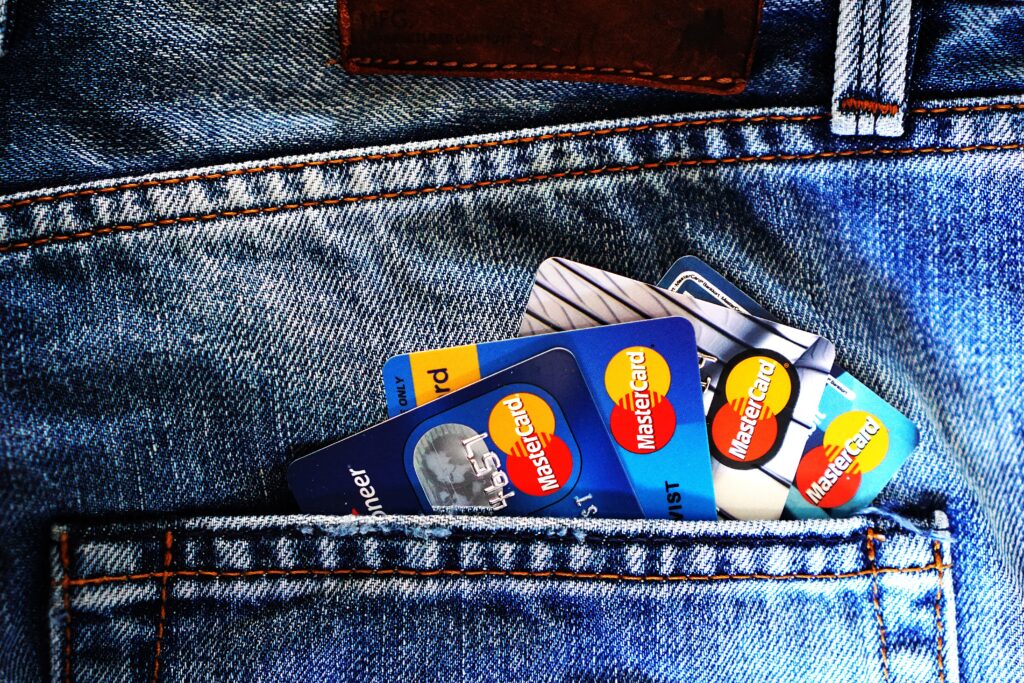Navigating the world of credit cards can be both rewarding and challenging. When used responsibly, credit cards can offer numerous benefits, including convenience, rewards, and building credit history.
However, it’s important to remember that credit cards are also a form of debt. When you use your card, you’re borrowing money from the bank or credit union. If you don’t pay off your balance in full each month or make at least the minimum payment due on time, you’ll incur interest charges on your outstanding balance (i.e., what you still owe). The more you borrow and the longer it takes to pay back your debt (i.e., the longer it takes for you to pay off your balance), the more money it will cost you in interest charges!
Here are some tips and pitfalls to keep in mind:
TIPS:
Choose Wisely
When it comes to credit cards, there’s no one-size-fits-all option. You have to do some research and find the card that best suits your needs.
The first thing to consider is interest rates. If you pay off your balance each month, a lower rate is better for you than a higher one. But if you tend to carry a balance over from month to month, look for a card with a low interest rate or even no interest at all.
Then think about annual fees. Some cards charge yearly fees that can range from $25-$100, while others don’t charge any fee at all! If you think you’ll use the perks of certain cards enough to offset the fee, then go ahead and pick up that card; otherwise, consider another option.
Finally, think about rewards programs and special perks like cash back or travel points—these can help make up for any fees being charged on other cards in your wallet!
Pay On Time
If you want to keep your credit score in the green, make sure you always pay your credit card bills on time. Missing a due date can result in late fees, which will ding your credit score and make it harder for you to get approved for loans or credit cards in the future. To avoid this, set up automatic payments or reminders so that you don’t forget to pay.
Monitor Your Spending

It’s easy to lose sight of how much you’re spending when you have a credit card. But if you don’t keep track of your spending, it’s easy to fall into debt and overspend. To avoid this, create a budget and stick to it. You might want to set aside a certain amount for groceries each week, or for entertainment each month. By setting aside specific amounts for certain items in advance, you’ll be less likely to overspend when the time comes.
Understand Rewards Programs
Rewards programs are one of the best things about credit cards. You get to earn points, miles, or cash back just by using your card—and then you can use those points to pay for stuff you already want! But it’s important to be aware of how rewards work. Some rewards programs have strict rules about what you can spend them on (like the Chase Freedom Unlimited, which only allows you to redeem points for travel), while others may not have any restrictions at all (like the Chase Sapphire Preferred).
If your card offers rewards or cashback, familiarize yourself with the program’s terms and conditions. Take advantage of rewards without overspending just to earn more points. If a particular purchase doesn’t seem worth it just for the extra cashback, don’t do it!
Credit Utilization Ratio
In the past, people with good credit scores were able to get loans and credit cards easily, while people with lower scores had a harder time. But now, it’s not just about how much money you make or how much debt you have. It’s also about how much of your available credit you use at any given time.
This percentage is known as your “credit utilization ratio.” The lower this ratio is, the better! To calculate it, add up all of your accounts’ balances and divide them by their combined credit limits. So if you have 3 credit cards, each with a $5,000 limit and $1,500 in balance on each card, your total balance would be $4,500 and divided by $12,000 (3 x 5), which equals 30%.
Pitfalls:
Carrying a Balance
Credit card debt is one of the biggest financial issues facing people today. If you carry a balance on your credit card, you’re paying interest on the outstanding amount. This can quickly lead to debt accumulation and financial strain.
If you have a credit card and are carrying a balance, it’s important to take steps to avoid becoming overwhelmed by debt. First, make sure that you pay off your balance in full each month. If possible, try to only charge what you can pay back within the same billing cycle.
Next, make sure that you do not spend more than 20% of your monthly income on credit card payments—this should include all interest payments and fees as well as any minimum payments due on other loans or credit cards.
Opening Too Many Cards
Opening too many credit cards can have an impact on your credit score. Each time you apply for a new card, it results in a hard inquiry. Hard inquiries can lower your score temporarily and make it harder to get approved for new credit cards or loans.

If you’re going to apply for multiple cards within a short period, we recommend waiting at least six months between each application. This will help ensure that all of your inquiries have been removed from your report and are no longer affecting your score.
Only Paying the Minimum
When you’re paying off a debt, it’s tempting to just pay the minimum amount due and keep moving. But if you do that, you’re missing out on a great opportunity to save money!
Paying only the minimum amount due can extend the time it takes to repay the debt, and it can also increase the overall interest paid.
Let’s say you have a $10,000 student loan at 5% interest. If you make an extra $100 payment each month (which is about what most people can afford), then after 10 years you’ll have saved yourself $4,500 in interest charges alone: that’s almost half of what you owe! That’s because paying even a small amount extra each month reduces your balance faster than if you only made payments at the minimum rate.
Closing Old Accounts
Closing old credit card accounts can negatively impact your credit score, as it reduces your available credit and shortens your credit history. But if you have an old card that has a high interest rate, has a monthly fee, or has other fees attached to it, you may want to consider closing the account and opening a new one with a lower interest rate.
If you have multiple cards with balances on them, you may want to close some of them in order to lower your overall debt load. When you close an account, it will no longer show up on your credit report, which means that creditors will no longer see it when they review your credit history. You’ll need to make sure that all payments are made up-to-date before closing an account so that no negative information remains on your report when it’s removed.
So there you have it! By avoiding common pitfalls and following best practices, you can make credit cards work to your advantage and build a strong financial foundation.
RUCHI RATHOR Founder & CEO
Payomatix Technologies Pvt. Ltd.
FOUNDER AND INVESTOR | PAYMENTS PROCESSING EXPERT | MERCHANT ACCOUNT SOLUTIONS | WHITE LABELLED PAYMENT GATEWAY | Dreamer, Creator, Achiever, Constantly Evolving
Website Ruchi Rathor: https://ruchirathor.com
Website Healing Heart https://thehealingheart.me/
Instagram https://www.instagram.com/ruchirathor/
LinkedIn https://www.linkedin.com/in/ruchirathor12/
Facebook https://www.facebook.com/ruchi.rathor.magnificient
Tumblr https://www.tumblr.com/blog/ruchirathor-thehealingheart
Medium https://medium.com/@ruchirathor_23436

